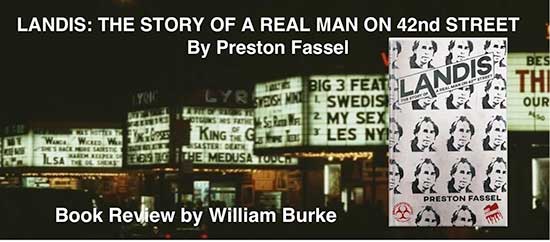
One of the perks of membership in the Horror Writers Association is being sent pre-publication arcs from fellow writers seeking the lofty Bram Stoker award. One of the highlights was Preston Fassel’s biography, Landis: the Story of a Real Man on 42nd Street. It’s a true labor of love, chronicling the rise, fall, second rise and eventual fall of semi forgotten, yet vitally important film journalist Bill Landis. Anyone who loves cult movies, exploitation films and low budget horror owes a debt to Landis and his manually typed, xeroxed creation Sleazoid Express.
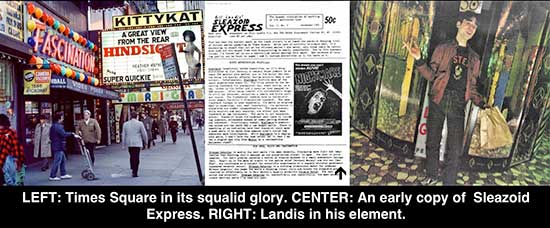
But understanding Landis requires a working knowledge of his home turf—New York’s Times Square. I’m not talking about the family friendly, M&M and Disney Store infested Times Square of today. No, our tale is set back in the early eighties, when The Deuce (local slang meaning Forty Deuce), was a virtual no man’s land. The urban squalor that had festered during Mayor Lindsay’s administration had reduced this prime chunk of real estate to a dark carnival of grindhouses, live peep shows, and porn theaters inhabited by streetwalkers and drug dealers. Back then running the gauntlet from 7th avenue to the Port Authority Bus Terminal after dark was like something from Battle Royale.
This was the New York I moved to in 1983; a place where you could still watch triple bills of Ilsa, She Wolf of the SS and all its sequels for pocket change. 42nd Street was a never-ending Cannes Film Festival of trash where I spent many weekends binging on cinematic shockers that would be forgotten until they were reincarnated with the emergence of DVD.
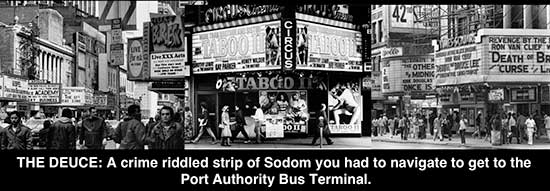
But at that time a turf war was already brewing in New York, with Times Square as its ground zero. On one side were the entrepreneurs running the peepshow emporiums, live sex shows and 24/7 grindhouses. These businesses were, at best, vaguely legal, but those shady operators were too dug in and mobbed up to walk away without a fight. On the opposing side were real estate developers with dollar signs in their eyes, poised to transform The Deuce into a soulless Branson, Missouri clone. It took a while, but In 1993, thanks to Rudy Giuliani, the realtors won. Buildings were seized by the city, only to be sold under the table to realtors, who bulldozed the old Times Square into oblivion.
Thankfully, Bill Landis was there to immortalize all the immorality before it was swept away.
While I was a novice Times Square explorer, Landis was its Magellan, navigating the depths of the sleaziest grindhouses and dive bars. He shared those discoveries in his proto fanzine, Sleazoid Express. Sleazoid was the first journal to study exploitation and low budget horror films. His typed and xeroxed newsletter beat Fangoria and Psychotronic magazines to the punch, coming decades before Quentin Tarantino made grindhouse cinema into a marketable cultural staple. Unlike conventional film critics of his day, Landis recognized and appreciated that, even in bad art there was artistry, and his reviews distilled what made these films unique. While Landis didn’t necessarily invent the cult film movement, he served as its Jack Kerouac. But instead of beats poets and artists, Landis cavorted with grindhouse filmmakers, hustlers and live sex show performers. His film reviews were also a travelogue of his encounters with the denizens of grindhouse emporiums, where even a trip to the men’s room meant taking your life in your hands. His Sleazoid Express reviews brought all that surrounding madness to life, with its muddy, typewritten, xeroxed format adding an extra layer of verisimilitude.
I actually met Bill Landis through a co-worker who happened to live across the hall from him in a union square brownstone. I expressed my love of horror and exploitation films to Landis, who was openly dismissive, deeming me a lookie-loo at best. I suppose, compared to him I was. Hell, anybody was—the man lived and breathed for Times Square. But Landis’ downfall was loving something incapable of loving him back.
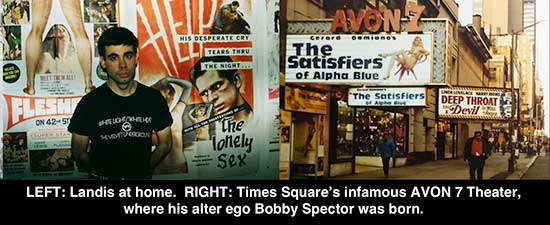
The brilliant southern gothic author Harry Crews (A Feast of Snakes) once said, “A writer’s job is to get naked, to hide nothing, to look away from nothing, to look at it. Strip it down and let’s get where the blood is, where the bone is.” Landis lived by the same code, but lacked Crews’ Kevlar strength layer of self-discipline. While Landis was devouring the Deuce lifestyle, it was also consuming him, eventually reducing this IT professional with a Master’s Degree to a drug addicted porn theater projectionist and adult video performer working under the nom de porn, Bobby Spector. Landis recorded his downward spiral in the pages of Sleazoid and in pieces for The Village Voice. Those articles were part journalism, part serialized suicide note.
Fassel brings that transformation and downward spiral to life. The author tracked down the surviving people that had been close to Landis (man, the casualty list is staggering!) who shared their memories of a man who was both an impassioned film journalist and a vindictive tormentor of anyone that offended him. Among those making Landis’ S**t list were exploitation film director Joel Reed (Bloodsucking Freaks), who he had some doomed to fail business dealings with, along with legendary underground filmmaker Kenneth Anger (Scorpio Rising), who eventually put an Alistair Crowley death curse on him. Even his long-time writing partner, and Russ Meyer biographer Jimmy McDonough became a target for his wrath.
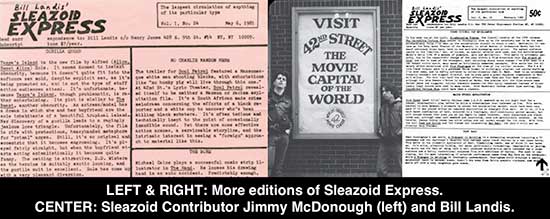
But don’t pick up Fassel’s book expecting a TMZ style piece of slanderous infotainment. The author takes no morbid glee in Landis’ descent, nor does he sensationalize the more salacious moments. He’s always searching for rays of light in the darkness, and cheering for his subject, even though he already knows how the tale ends. His passionately written introduction, ‘Ghosts of Times Square,’ lays out the man and his turf perfectly… so perfectly that it gave me chills.
On the lighter side, we also get a reprint of Landis’ ground breaking Fangoria interview with filmmaker Andy Milligan (Bloodthirsty Butchers, Fleshpot on 42nd Street). Oh, Fangoria publisher Bob Martin eventually wound up on Landis’ s**t list, proving the man never met a bridge he couldn’t burn!
Landis lived a life worth recounting, and it’s vividly captured in a biography that deserves to be read. Fassel’s book is published by Encyclopocalypse Publications and is available on Amazon. It is highly recommended, as is his award-winning debut novel Our Lady of the Inferno.
And if you’re craving more fictional horror check out my latest novel Dominant Species from Severed Press, because any review of fine journalism should end with a shameless plug.















































































